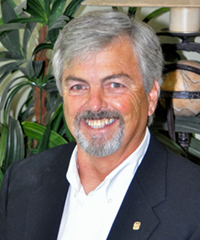|
Gary Priest: Making a Career of Being There and Being Ready
 By Donald Janssen, DVM By Donald Janssen, DVM
I enjoy watching leaders who combine a big vision with broad organizational influence. These leaders often find themselves in the right place at the right time. When a problem arises, they are the ones there and ready to help. And sometimes, they find solutions that forever change the way people think and the way things are done.

Gary Priest
|
I encountered a situation needing that kind of solution when I was a veterinarian at the San Diego Zoo in the late 1980s. We had just diagnosed diabetes in an adult male drill monkey known as "Loon." His species was among the most endangered primates in Africa. To survive, Loon would need insulin injections and reliable monitoring of blood and urine glucose for the rest of his life. One of the senior trainers for the animal shows heard about it and offered to help. That trainer was Gary Priest.
Gary will retire soon, after almost 36 years with San Diego Zoo Global, leaving a memorable legacy. In the early days of his career, though, zoos gave little attention to training animals for their medical and husbandry needs. But Gary viewed things differently. He was among the pioneers in behavioral husbandry with marine mammals. Applying those skills, Gary went to work, making it possible for us to manage Loon's diabetes.
Gary gained Loon's trust through consistent, positive reinforcement. Before long, this formidable animal willingly accepted insulin injections and provided urine samples on request. Later, Gary taught him to place his whole arm into a metal sleeve, allowing safe blood collection for glucose monitoring. With the assurance we could manage his disease, he was free to live and interact with other animals in an enriched environment. Loon thrived under this care for years, contributing his genetic material to San Diego Zoo Global's Frozen Zoo.
Loon's case proved to me that behavioral husbandry was vital to animal health and welfare. But it was Gary's influence and character that changed the industry mindset of how and why we train animals. Training became a way for animals to take part in their own care and benefit. Gary's staff says with pride that he brought legitimacy to the field of zoo behavior management. Gary became the head of San Diego Zoo Global's Animal Behavior Management department. Dozens of innovative ideas emerged from Gary and his team. They used operant conditioning to solve other animal medical and husbandry concerns. They connected zoo guests to the conservation message. And they made that connection through unique animal encounters that left lasting memories.
Building trust was always at the foundation of Gary's animal work. Building trust also set him apart in his relationships with people. And those trusting professional relationships helped Gary be there and ready when doors opened to explore new frontiers. As each opportunity arose, Gary found himself in the right place and time, ready with the right skills.
Gary was there and ready in the early 1990s to develop a new way, based on operant conditioning, to manage zoo elephants. For thousands of years, elephants had been managed with free contact. To make changes, he faced stiff opposition, despite the clear dangers of that system. But Gary and his team persisted. They produced a protected contact program for zoo elephant management that has now become the global standard.
Gary was there and ready as the field of zoo animal behavior grew. He was the founding director and the third president of the Animal Behavior Management Alliance (ABMA). Gary influenced the ABMA to expand its vision for operant conditioning of zoo animals. At about the same time, Gary was appointed to the Association of Zoos and Aquariums' new and important Animal Welfare Committee. He was also a leader in developing standards for animal enrichment. All in all, Gary's leadership was a big part of making behavior management a zoological industry best practice.
Gary became known as someone who had broad professional contacts and could work with a big vision. So, it isn't surprising he was tapped to create a new online program for keeper training and development at San Diego Zoo Global. Again, he was there and ready. He and his boss, Jon Prange, worked in a powerful partnership to create an entirely new product. Launched in 2012, the San Diego Zoo Global Academy has become a world-class, online training platform for zoo professionals. It has come to serve the entire industry, and continues to find new ways to share quality content.
Gary is one of those exceptional leaders whose career has mattered. His legacy and influence are visible throughout the zoo and aquarium world. At his heart, he is a gifted teacher and a successful trainer of people and animals. With a clear purpose, he prepared himself with key skills and was willing to step up and serve where needed. He is a leadership model for us all. He has shown us how to succeed by being there and being ready.
You have touched us and made us better, Gary. May you enjoy many retired years with your family and friends.
For more information about this article, please contact Dr. Don Janssen at don.janssen@gmail.com.
Leadership insights are contributed by San Diego Zoo Global's retired corporate director of animal health, Dr. Don Janssen, the first of which appeared in the March 2019 issue of the Academy newsletter. Click here for the Academy newsletter archive.
To learn more about how to put behavior-based standards in place, read Upside Down Leadership: A Zoo Veterinarian's Journey to Becoming a Servant Leader. You'll find the book at ShopZoo, Amazon (including a Kindle version), and Barnes & Noble.
|